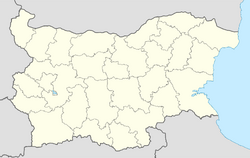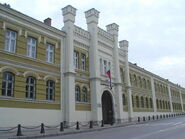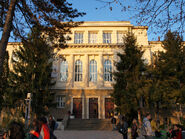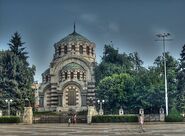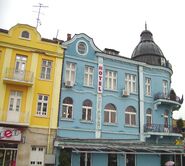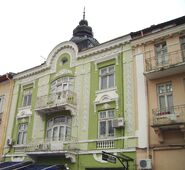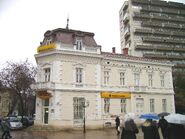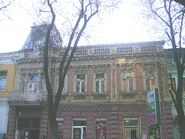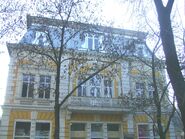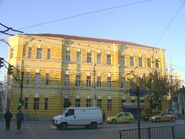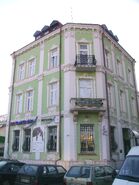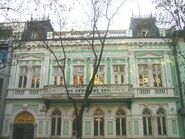| Pleven Плевен |
|||
|---|---|---|---|
| Pleven Collage | |||
|
|||
| Coordinates: | |||
| Country | Bulgaria | ||
| Province (Oblast) |
Pleven | ||
| Government | |||
| • Mayor | Nayden Zelenogorski (UDF) see List of mayors of Pleven |
||
| Elevation | 116 m (381 ft) | ||
| Population (Census February 2011)[1] | |||
| • City | 106,011 | ||
| • Urban | 129,781 | ||
| Time zone | EET (UTC+2) | ||
| • Summer (DST) | EEST (UTC+3) | ||
| Postal Code | 5800 | ||
| Area code(s) | 064 | ||
Pleven (Bulgarian: Плевен pronounced [ˈplɛvɛn]) is the seventh most populous city in Bulgaria. Located in the northern part of the country, it is the administrative centre of Pleven Province, as well as of the subordinate Pleven municipality. As of February 2011, the city has a population of 106,011 inhabitants.[1]
Internationally known for the Siege of Plevna of 1877, it is today a major economic centre of the Bulgarian Northwest and Central North and the third largest city of Northern Bulgaria after Varna and Rousse.
Geography[]
Pleven is located in an agricultural region in the very heart of the Danubian Plain, the historical region of Moesia, surrounded by low limestone hills, the Pleven Heights. The city's central location in Northern Bulgaria defines its importance as a big administrative, economic, political, cultural and transport centre. Pleven is located 170 km away from the capital city of Sofia, 320 km west of the Bulgarian Black Sea Coast and 50 km south of the Danube.
The river Vit flows near the town and the tiny Tuchenitsa river (commonly known in Pleven as Barata, literally "The Streamlet") crosses it.
Climate[]
The climate is temperate continental, with cold winters (down to –15°C) and hot dry summers (up to +35-44°C).
History[]
Prehistory and antiquity[]
The earliest traces of human settlement in the area date from the 5th millennium BC, the Neolithic.
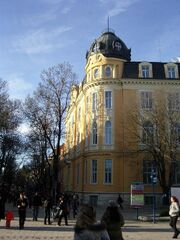
The central streets of Pleven
Numerous archaeological findings, among them the Nikolaevo treasure found in Bulgaria, evidence for the rich culture of the Thracians, who inhabited the area for thousands of years.
In the beginning of the new era, the region became part of the Roman province of Moesia, and a road station called Storgosia arose near present-day Pleven on the road from Oescus (near modern Gigen) to Philippopolis (now Plovdiv). It later evolved into a fortress. One of the most valued archaeological monuments in Bulgaria from the period is the Early Christian basilica from the 4th century discovered near the modern city.
Middle Ages[]
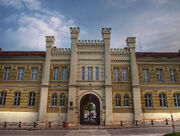
Pleven Regional Historical Museum
During the Middle Ages, Pleven was a well-developed stronghold of the First and the Second Bulgarian Empire. When Slavs populated the region, they gave the settlement its contemporary name (Pleven is derived either from the Slavic word "plevnya" ("barn") or from "plevel", meaning "weed", which share the same root). The name was first mentioned in a charter by Hungarian king Stephen V in 1270 in connection to a military campaign in the Bulgarian lands.
Ottoman rule[]
During the Ottoman rule, Pleven, known as Plevne in Ottoman Turkish, preserved its Bulgarian appearance and culture. Many churches, schools and bridges were built at the time of the Bulgarian National Revival. In 1825, the first secular school in the town was opened, followed by the first girls' school in Bulgaria in 1840, as well as the first boys' school a year later. Pleven was the place where the Bulgarian national hero Vasil Levski established the first revolutionary committee in 1869, part of his national revolutionary network.
Siege of Plevna[]
The city (then mostly known as Plevna outside Bulgaria) was a major battle scene during the Russo-Turkish War of 1877–1878 that Russian Tsar Alexander II held for the purpose of the liberation of Bulgaria. The joint Russian and Romanian army paid dearly for the victory, but it paved the path to the defeat of the Ottoman Empire in this war, the restoration of Bulgaria as a state and the independence of Romania from Ottoman Empire. It cost the Russians and Romanians 5 months and 38,000 casualties to take the town after four assaults in what was one of the decisive battles of the war. The siege is remembered as a landmark victory of the Romanian War of Independence as on 28 November 1877 the Plevna citadel capitulated, and Osman Pasha surrendered the city, the garrison and his sword to the Romanian Colonel Mihail Cerchez.
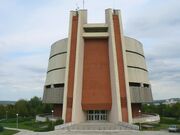
Pleven Panorama, one of the town's best known sights
The Encyclopædia Britannica Eleventh Edition of 1911 concluded its lengthy entry on Pleven (transcribed as Plevna) with the memorable dictum:
| “ | Plevna is a striking example of the futility of the purely passive defence, which is doomed to failure however tenaciously carried out... Victories which are not followed up are useless. War without strategy is mere butchery.[2] | ” |
On the other hand, Siege of Plevna stands out among other countless sieges and military actions in the region because of its significance.[3] Without this fortress slowing the Russian onslaught, which gave the Great Powers time to intercede, Constantinople would have been repossessed by a Christian army once more.
| “ | Plevna is one of the few engagements that changed the course of history.[4] | ” |
Modern history[]
The events of the Russo-Turkish War proved crucial for the development of Pleven as a key town of central northern Bulgaria. The town experienced significant demographic and economic growth in the following years, gradually establishing itself as a cultural centre of the region.
The Bulgarian Agrarian National Union, a leading interwar party representing the Bulgarian peasantry, was founded in the town in December 1899.
Prior to the Bulgarian orthographic reform of 1945, the name of the town was spelled Плѣвенъ (with yat) in Cyrillic.
Demographics and religion[]
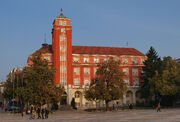
The town hall of Pleven
According to census 2011, Pleven has a population of 106,011 inhabitants as of February 2011.[1] The ethnic breakdown is 94% Bulgarians and 5% Roma, with other ethnic groups being represented by about 1%. The number of the residents of the city reached its peak in the period 1988-1991 when exceeded 135,000.[5] The following table presents the change of the population after the liberation of the country in 1878.
| Pleven | |||||||||||||
|---|---|---|---|---|---|---|---|---|---|---|---|---|---|
| Year | 1887 | 1910 | 1934 | 1946 | 1956 | 1965 | 1975 | 1985 | 1992 | 2001 | 2005 | 2009 | 2011 |
| Population | 14,307 | 23,049 | 31,520 | 39,059 | 57,555 | 78,933 | 107,883 | 129,863 | 130,747 | 121,880 | 113,700 | 111,426 | 106,011 |
| Highest number 130,747 in 1992 | |||||||||||||
| Sources: National Statistical Institute,[1][5][6] „citypopulation.de“,[7] „pop-stat.mashke.org“,[8] Bulgarian Academy of Sciences[9] | |||||||||||||
An overwhelming majority of 90% of Pleven's residents are Eastern Orthodox Christian, while 5% of the population follows Islam. The Diocese of Nikopol, of which Pleven is part, is one of the two Roman Catholic dioceses in Bulgaria, and another 5% of the residents are Roman Catholic by faith, a significant number compared to other Bulgarian cities.
Pleven has three Eastern Orthodox churches, the Bulgarian National Revival St Nicholas Church (1834) that was constructed at the place of a chapel from the Second Bulgarian Empire, the St Paraskeva Church (1934) and the Holy Trinity Church, built in 1870 at the place of a church mentioned as early as 1523 and inaugurated by Exarch Antim I. As of 2005, a new Eastern Orthodox church is being built in the Strogoziya quarter.
The construction of a large Roman Catholic church of Our Lady of Fatima began in 2001. A mosque also exists in the town to serve the needs of the Muslim population, as well as a Methodist church that is situated on the site of the former local puppet theatre.
Economy[]

Two banks in central Pleven
A major centre of oil processing, metalworking, machinery construction, of light and food industries in Socialist times, after 1989 Pleven found itself in an economic crisis, with many of the major enterprises (such as the Plama oil refinery) closing or practically ceasing to work. However, the late 1990s and early 2000s saw a revival of light industry and the development of branches such as knitwear and store clothes production. Tourism, which had attracted many people from the Soviet Union prior to 1989, and had experienced a slump in the following years, is on the rise again. Other economic branches have also improved in the 2000s. The unemployment has fallen from 17% in 2000 to 7.5% in 2005 and continues to decrease.
The city has seen a number of major foreign investments in the late 1990s and early 2000s. Particularly noticeable is the mass construction of hypermarkets, with three Billa, two Kaufland, two Carrefour (in construction- first one to open in MALL PLEVEN in 2011), twopenny market (1 in construction), DM, Plus (in construction), ELEMAG, METRO, two LIDL (in construction) stores, a Praktiker, bauMax and a number of other hypermarkets being opened. The Pleven City Center and central mall pleven mall was opened in 2008. In 2005, the investments in the economy of Pleven amounted to around 250 million leva (around €125 million).
Transport[]
The international railway Sofia — Bucharest — Moscow runs through Pleven. The international road E 83 passes just north of the city. The national A2 Hemus highway Sofia — Varna is projected to pass 16 km south of Pleven. The inner city transportation in Pleven is maintained mainly by trolleybuses. There are 14 trolleybus lines and 75 km trolleybus network and also 14 bus lines. The trolleybus fleet consist of 70 ZIU-682 trolleybuses produced 1985–1988. A project for 12 km trolleybus routes extension, was announced by the Pleven municipality and expected to start 2009.
Transmitter[]
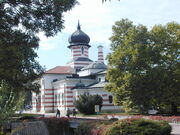
Svetlin Rusev Donative Exhibition
Near Pleven, there is a large facility for medium wave and short wave broadcasting. Pleven medium wave transmitter, working on 594 kHz, uses as antenna two 250 metres tall guyed mast radiators insulated against ground. These masts belong to the tallest structures of Bulgaria.[10]
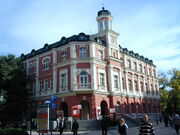
Ivan Radoev Dramatic Theatre

Museum of the Liberation of Pleven
Main sights[]
Most of the sights of the town are related to the Russo-Turkish War. The monuments related to the war alone are about 200. Some of the more popular include the St George the Conqueror Chapel Mausoleum in honour of the many Russian and Romanian soldiers who lost their lives during the Siege of Plevna and the ossuary in Skobelev Park. Another popular attraction is Pleven Panorama, created after (and reputedly larger than) the Borodino Panorama in Russia on the occasion of the anniversary of the Siege of Plevna.
Culture[]
The Pleven Regional Historical Museum is another popular tourist attraction, while the Svetlin Rusev Donative Exhibition, situated in the former public baths, exhibits works by Bulgarian artists, as well as noted Western European art figures like Pablo Picasso, Francisco Goya, Honoré Daumier, Marc Chagall, Maurice Denis, Pierre-Auguste Renoir, Salvador Dalí, Renato Guttuso and Eugène Delacroix, Auguste Rodin and Edgar Degas.
The Ivan Radoev Dramatic Theatre is the centre of theatrical life in Pleven. A number of community centres (chitalishta) are also active in the city.
Sport and recreation[]
Pleven is often regarded as an important centre of sports in Bulgaria, with many noted Bulgarian sportspeople having been born and/or trained in the town, including Tereza Marinova and Galabin Boevski. The sports school in Pleven is thought of as one of the most prominent in the country.
The city hosts two football clubs, Spartak Pleven and Belite orli, which have separate stadiums. Both teams play in the second Bulgarian league and haven't had any major successes in the past, although Spartak Pleven has been the first team for a couple of former Bulgarian internationals such as Plamen Getov.
Spartak Pleven is also a basketball team, a national championship winner in 1995 and national cup winner in 1996 (then named Plama Pleven). Other than that, the team is a regular first league participant.
Pleven is famous for its Kaylaka (where the ruins of the Storgosia fortification can be found) and Skobelev parks. The latter is home to the Pleven Panorama and is situated on the original location of the battle during the Russo-Turkish War.
Military[]
The Reserve Officers' School was located in Pleven from 1961 to its closing on May 28, 2008.[11]
Notable natives[]
- Iliya Beshkov, artist
- Dionisii Donchev, artist
- Lucy Diakovska, singer
- Emil Dimitrov, singer and composer
- Silvia Dimitrova, artist
- Tereza Marinova, triple jump athlete, 2000 Summer Olympics gold medallist
- Svetlin Rusev, artist
- Krassimir Rangelov, sculptor
- Slavi Trifonov, popular showman
Twin cities[]
|
|
Honours[]
- A city in Kansas and a town in Montana in the United States, as well as a village in Ontario, Canada were named after Pleven, or more precisely its historical name in English Plevna, the reason for which is the battle in 1877.
- A road in Hampton, Middlesex, London is named Plevna, adjoining another called Varna Road both made up of Victorian terraced housing built in 1870s and named after the battles in Bulgaria of the period.
- Pleven Saddle on Livingston Island in the South Shetland Islands, Antarctica is named after Pleven.
- In other countries there are five cities and towns named after Plevna, and eighteen Plevna streets in Britain alone[12]
Gallery[]
Notes[]
- ^ a b c d (Bulgarian) National Statistical Institute - Main Towns Census 2011
- ^ "Plevna". Encyclopædia Britannica Eleventh Edition. 1911. http://www.1911encyclopedia.org/Plevna.
- ^ "The Balkan Wars", Andre Gerolymatos, 2002, Basic Books, p.204
- ^ {"Struggle for Mastery", Talor, pp.239–241
- ^ a b (Bulgarian) National Statistical Institute - Towns population 1956-1992
- ^ (English) Bulgarian National Statistical Institute
- ^ (English) „WorldCityPopulation“
- ^ „pop-stat.mashke.org“
- ^ (Bulgarian) Bulgarian Academy of Sciences
- ^ "Predavatel • Радио и телевизия в Плевен, Radio & Television in Pleven". www.predavatel.com. http://www.predavatel.com/bg/8/ple.htm#rps2. Retrieved 18 October 2008.
- ^ Школа за запасни офицери
- ^ www.davidkidd.net/20Plevna.html.
See also[]
- List of cities and towns in Bulgaria
References[]
- "Община Плевен" (in Bulgarian). http://www.pleven.bg/.
External links[]
- Municipality of Pleven
- Pictures from Pleven
- Pictures from the Panorama building
- Regional Historical Museum
| |||||||||||||||||||||||||||||||||||||||||||
| This page uses content from the English language Wikipedia. The original content was at Pleven. The list of authors can be seen in the page history. As with this Familypedia wiki, the content of Wikipedia is available under the Creative Commons License. |


